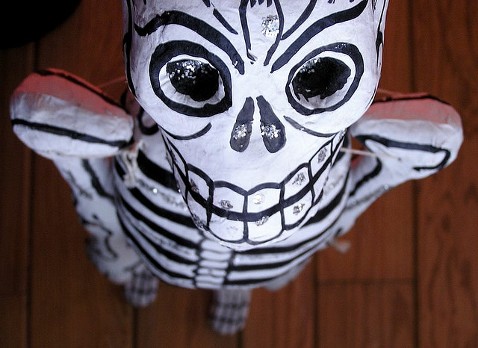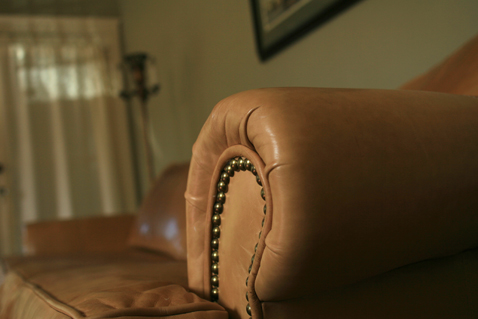good grief
/'Tis very true, my grief lies all within;
And these external manners of laments
Are merely shadows to the unseen grief
That swells with silence in the tortured soul;
There lies the substance: and I thank thee, king,
For thy great bounty, that not only givest
Me cause to wail but teachest me the way
How to lament the cause.
A voice. It sounds as though it is coming from far away although its source is right next to my ear. "Stop it. You're embarrassing yourself," he hisses at me. I don't respond. I don't stop. "You're scaring that little boy."
I can feel his muscles tensing, wanting to move away from me. But he doesn't.
I have fallen into parts. A dry, thin, Greek chorus of me hovers up close to the ceiling. Tutting and disapproving. Scathing. All this emotion. So very florid and unprepossessing. It idly ponders things like the upholstery on the chairs and the many layers of gloss paint on the hot water pipes, painted and repainted over and over again. Bored with the hysterical fit taking place beneath.
I note the frightened face of the young boy with distant horror. "Shut up, shut up, shut up," I whisper at the collection of other fragments of me gathered on the floor of the same hospital corridor.
They form a fleshy tube designed for howling through, with my physical features stretched and wrapped around its outside. They slump on the floor, melodramatically collapsed. They wail and leak. And continue to wail and leak. Blood, milk, water, phlegm. They are beyond being reasoned with.
The distant pieces inform me that I should be embarrassed and mortified. And I am sorry for scaring that passing little boy. Very sorry indeed. It seems to me that his mother has an accusatory glint in her eye. But I cannot stop.
He looks at me, my husband, with a look that has been repeated many times since.
You are doing this all wrong, you are very strange and you are a stranger to me. You are, not to mince my words, completely and utterly batshit crazy. My wife, what on earth has happened to you?
***
This is not how I thought I would react. I had an idea, before I had experienced any such thing, that I would be elegant in grief. Graceful. Gracious. I imagined that I would retain my kindness. That I would be considerate. That I would be the tower of strength that others could lean against.
But I never imagined that the first death I would contend with would be that of my child. My three day old daughter. It transpired that I simply couldn't grieve for her quietly or discretely. This experience knocked my small claims to calmness, stoicism and compassion over the head and carried them off. Leaving a space to be occupied by my inner banshee.
Death didn't barge in. Not yet.
I still wanted to pretend that I hadn't even seen Death come in at the door. Because, in my childish grief mind, if I didn't see Death, perhaps he wouldn't see me. Or them. Besides there was no room for Death. There was no room for anyone at all apart from me and my daughters. I barged in on myself and squashed my face into my own face so hard, that I could no longer see. There was only me. My grief. My pain. My own closed eye pressed up against my own closed eye. Forming a greedy trinity with my children that occupied my entire field of vision, relegating my husband, my sister, my mother, my father, manners, social conventions, simple human decency, all to the peripheries.
I was not the ascetic grieving mother, dressed in black with a single tear welling in the corner of her eye. Grief didn't endow me with restraint or wisdom. I was a despairing, empty thing with a ravening maw. Cramming myself with sweet things, fussing like a toddler over being too warm, too cold or too tired. As though all the inhibitory circuits in my brain and the taboos ingrained therein had been abruptly switched off. I wanted to scream and drum my heels deep, deep into the ground. Eat twenty three packets of chocolate biscuits. Walk around all day wrapped in a duvet. Storm around in tears, unable to contain anything, sending it all spinning out into the ether.
But a few weeks later, I woke up, showered, dressed, brushed my hair, applied my make up and drove to the hospital. I sat quietly by the remaining incubator. Tears moistened the corners of my eyes. When one of the nurses asked me why I looked so grumpy, I replied, "Oh, that's just the way I look. No need to worry. I'm fine."
An internal switch had been thrown and I can't go back. To that greedy, grasping, uninhibited sadness. Sometimes I almost regret it, almost miss it. I don't think I'll ever cry for my daughter on the floor of a supermarket again. No matter how much I might feel as though I want to.
***
I am not proud of my behaviour in the immediate aftermath of Georgina's death. I have had to apologise to many people. But I don't know how to find that little boy or the young man who rounded the corner of the supermarket aisle looking for a tasty snack only to be confronted by a wailing woman in amongst the crisps.
At the time, it didn't feel anywhere near enough. Part of me wanted to make even more fuss, to scream louder, to tear my hair and rip my fingernails out and leave them in a pile in the corridor, to scare more passing children. Surely my daughter's death deserved to be marked by more than the scaring of one paltry little boy?
At other times, it feels like too much. How could I have done that? How could I have folded in on myself so weakly, so comprehensively? How could I have frightened that little boy and embarrassed my husband? How cruel and how selfish.
Nobody can teach you how to lament. You can only muddle through in your own fashion.
And no matter how public the display, or how private the lamentation, it would have been only the merest shadow of that unseen grief, the substance of which is known only to me.
Do you feel that there is such a thing as 'good' grief? Some sort of standard (or polite) way of behaving in the event of a bereavement such as this? Do you feel other people might be holding you to this standard, judging your grief as a success or a failure? Are you even judging yourself?
Do you feel you let everything out or kept everything in? Do you feel proud of how you grieved? Or do you, like me, look back slightly shamefacedly?



